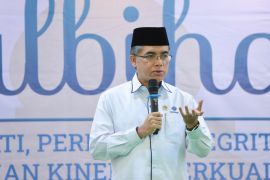"The banks interest rates in Indonesia are relatively higher than those in other ASEAN countries."Jakarta (ANTARA News) - The Indonesian Businessmen Association (Apindo) has expressed hope that the introduction of investment-friendly fiscal policies, such as tax cuts, will enable the domestic industry to grow by 7.1 percent in 2012.
In light of the rapid growth of the industrial sector in Indonesia, domestic investors who are members of the Indonesian Businessmen Association (Apindo) said they were convinced that the government could achieve its growth target of 7.1 percent in 2012.
"Industrial growth can reach 7.1 percent if the government continues to focus on developing the downstream sector. That will also attract investors," Apindo chairman Erwin Aksa stated.
However, he added, investors faced many challenges. The main constraints to industrial development include high bank lending rates and shortage of infrastructure.
"The banks interest rates in Indonesia are relatively higher than those in other ASEAN countries. In addition, the lack of port facilities and other infrastructures still hamper the industrial growth in Indonesia," Erwin noted.
"The laws on land procurement [still under deliberation in the House] and gas supply are also a problem. If the gas supply issue is not sorted out by the government, it could discourage investors," he said.
Earlier, Industry Minister MS Hidayat expressed optimism that the industrial sector would achieve the targeted 7.1 percent growth rate, adding that he expected the machinery and transportation equipment industry to be the largest contributor to economic growth.
"After experiencing a slow growth rate during the 2005-09 period, the manufacturing industrial sector has rebounded significantly. In 2011, the non-oil and gas processing industrial sector grew by 6.83 percent, which was higher than the national average of 6.46 percent. In 2011, the growth rate was the highest the sector had seen in the past five years," he said.
"The sub-sectors of the transportation equipment and machinery industry experienced the biggest growth," Hidayat noted.
"The transportation equipment and machinery industry rose by 8.98 percent, while the food, beverage and tobacco industry was up 7.03 percent, and the cement and non-metal quarrying goods industry jumped 6.92 percent," he added.
In the first half of 2012, the non-oil and non-gas processing industry grew by 6.09 percent, lower than the 6.35 percent growth seen during the same period last year.
The dip in the industry`s growth rate can be attributed to the global economic crisis, which has hampered Indonesia`s trade performance, particularly in export destination countries such as the United States, Europe, Japan and other ASEAN countries.
"I expect the Indonesian economy to realize its full potential and I hope the nation is able to maintain its industrial growth in the wake of improved economic conditions in the United States and Japan in 2012," Hidayat said.
"Indonesia`s economic growth is expected to be fuelled by its huge domestic market, which has a 134 million-strong middle class population," he added.
(Uu.A014/INE/KR-BSR/B003)
Editor: Priyambodo RH
Copyright © ANTARA 2012












